

Live: 31 dead, 94 injured in Urumqi terrorist bombing[1]- Chinadaily.com.cn. President Xi Jinping has pledged to punish the terrorists and restore order after attack at an open air market in the capital of Northwest China's Xinjiang Uygur autonomous region left 31 dead and more than 90 injured.
![Live: 31 dead, 94 injured in Urumqi terrorist bombing[1]- Chinadaily.com.cn](http://cdn.pearltrees.com/s/pic/th/injured-terrorist-chinadaily-85104261)
China Daily website provides the latest news, photos, and comments. 14:42 Thursday Witnesses describe terror attack in Urumqi A witness who was buying groceries at the market said he saw vehicles plough into people and also explosives thrown out of the vehicles. "I heard a series of large explosions and the vehicles were soon on fire, with flames rising so high they could reach the second floor of a building," the witness said. 13:10 Thursday President Xi vows to punish Urumqi bombers BEIJING - Chinese President Xi Jinping pledged to severely punish terrorists and spare no efforts in maintaining stability in response to Thursday morning's fatal explosions in Urumqi.
Explosives Attack In China Leaves Dozens Dead, More Than 90 Injured. BEIJING (AP) — Assailants in two SUVs plowed through shoppers while setting off explosives on a busy street market in China's volatile northwestern region of Xinjiang on Thursday, the local officials said, killing 31 people and injuring more than 90.
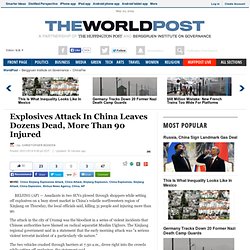
The attack in the city of Urumqi was the bloodiest in a series of violent incidents that Chinese authorities have blamed on radical separatist Muslim Uighurs. The Xinjiang regional government said in a statement that the early morning attack was "a serious violent terrorist incident of a particularly vile nature. " The two vehicles crashed through barriers at 7:50 a.m., drove right into the crowds while setting off explosives, the statement said. The SUVs then crashed head-on and one of them exploded, the official Xinhua News Agency reported. It quoted an eyewitness as saying there were up to a dozen blasts in all. "I heard four or five explosions. Ethnic tensions in China and geopolitics of the Uyghur question. China's Xi Vows 'Decisive Action' Following Deadly Train Station Attack. Chinese President Xi Jinping is promising "decisive action" following a deadly bomb and knife attack at a train station in the western province of Xinjiang.
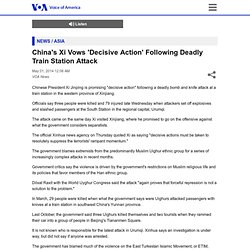
Officials say three people were killed and 79 injured late Wednesday when attackers set off explosives and slashed passengers at the South Station in the regional capital, Urumqi. East Turkestan Islamic Movement. The East Turkestan Islamic Movement (ETIM) (also known as the Turkistan Islamic Party (TIP), Turkistan Islamic Movement (TIM), and other names[a]; is a Waziri based group.
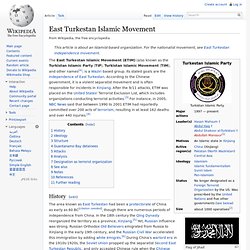
Its stated goals are the independence of East Turkestan. According to the Chinese government, it is a violent separatist movement and is often responsible for incidents in Xinjiang. After the 9/11 attacks, ETIM was placed on the United States' Terrorist Exclusion List, which includes organizations conducting terrorist activities.[3] For instance, in 2005, NBC News said that between 1990 to 2001 ETIM had reportedly committed over 200 acts of terrorism, resulting in at least 162 deaths and over 440 injuries.[4] History[edit] Flag of Jihad. July 2009 Ürümqi riots. The July 2009 Ürümqi riots[5] were a series of violent riots over several days that broke out on 5 July 2009 in Ürümqi, the capital city of the Xinjiang Uyghur Autonomous Region (XUAR), in northwestern People's Republic of China (PRC).
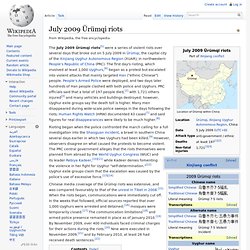
The first day's rioting, which involved at least 1,000 Uyghurs,[6] began as a protest but escalated into violent attacks that mainly targeted Han ("ethnic Chinese") people. People's Armed Police were deployed, and two days later hundreds of Han people clashed with both police and Uyghurs. PRC officials said that a total of 197 people died,[2] with 1,721 others injured[3] and many vehicles and buildings destroyed; however, Uyghur exile groups say the death toll is higher.
Many men disappeared during wide-scale police sweeps in the days following the riots; Human Rights Watch (HRW) documented 43 cases[7] and said figures for real disappearances were likely to be much higher.[8] Background[edit] Immediate causes[edit] Events[edit] Rebiya Kadeer. Second East Turkestan Republic. The Second East Turkestan Republic, usually known as the East Turkestan Republic (ETR), was a short-lived Soviet-backed Turkic people's republic.
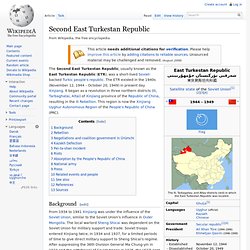
Xinjiang. Read or download Communist China’s Policy Of Oppression In East Turkestan. It has been shown in the preceding sections that the lands of East Turkestan have been Muslim for the last 1,000 years.
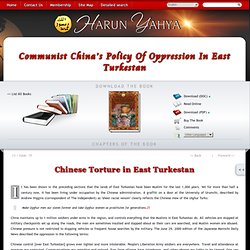
Yet for more than half a century now, it has been living under occupation by the Chinese administration. A graffiti on a door at the University of Urumchi, described by Andrew Higgins (correspondent of The Independent) as "sheer racial venom" clearly reflects the Chinese view of the Uighur Turks: Make Uyghur men our slaves forever and take Uyghur women as prostitutes for generations.25 China maintains up to 1 million soldiers under arms in the region, and controls everything that the Muslims in East Turkestan do. All vehicles are stopped at military checkpoints set up along the roads, the men are sometimes insulted and slapped about as their cars are searched, and Muslim women are abused. Chinese control [over East Turkestan] grows ever tighter and more intolerable. All believers share an equal responsibility in this matter.
East Turkestan. March 25, 2008 To download the profile for East Turkestan, click on the image above STATISTICS(2000 Population Census) Status: Autonomous regionPopulation: 19,250,000Capital City: UrumqiArea: 1.6 million km²Language: Uyghur.
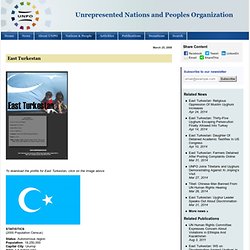
The official language is Chinese.Religion: IslamEthnic Groups: Uyghur, Kazakh, Kyrgyz, Uzbek, Tatar, Salar, Tajik, Mongol, Hui, Manchu, Xibe, Dagur, Russian, Chinese UNPO REPRESENTATION: World Uyghur Congress. East Turkestan. On the Uighur/Uyghur Uprising. The sad plight of the Uyghurs/Uighurs has been in the news for the past week or so.
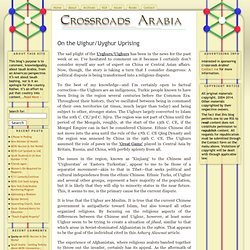
I’ve hesitated to comment on it because I certainly don’t consider myself any sort of expert on China or Central Asian affairs. Now, though, the story is taking a turn that I consider dangerous: A political dispute is being transformed into a religious dispute. To the best of my knowledge—and I’m certainly open to factual correction—the Uighurs are an indigenous, Turkic people known to have been living in the region several centuries before the Common Era. Throughout their history, they’ve oscillated between being in command of their own territories (at times, much larger than today) and being subject to other, stronger states.
East Turkestan.